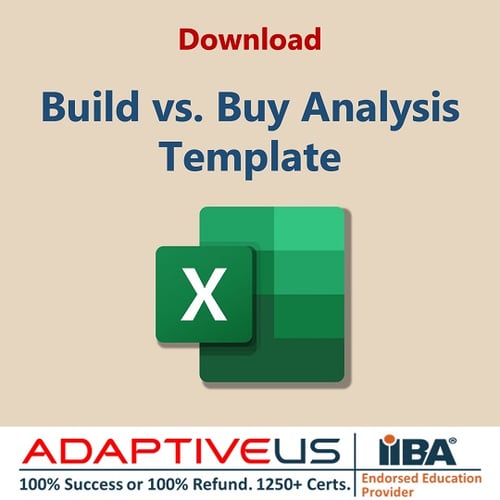Build vs Buy Analysis | Free Decision Matrix Template
The "build versus buy" analysis is a framework businesses use to make technology decisions. The analysis is used to compare the cost and benefits of developing a new technology internally (i.e. building) with the cost and benefits of purchasing an existing technology from an external supplier (i.e. buying). There are many factors to consider when conducting a build versus buy analysis, including development costs, time to market, technical risks, and more. The goal of this article is to provide a high-level overview of the build versus buy decision-making process and some of the key considerations for each option. Build versus buy analysis also also referred as Buy versus Build Analysis, buy vs build decision matrix. Some may even simply use a very shortened version of the technique, build v buy.
Benefits of building software
There are many benefits of building software, including the ability to tailor the software to your specific needs, the satisfaction of creating something from scratch, and the sense of ownership that comes with it. Building software can also be a great learning experience, giving you insights into how computers work and how to code. And if you're looking to save money, building your own software can be much cheaper than buying off-the-shelf solutions.
Challenges of building software
There are a number of challenges that can come up when building software internally, as opposed to purchasing an off-the-shelf solution. For one, it can be difficult to find the right talent to build a high-quality software product. In addition, the process of designing, developing, and testing software can be time-consuming and expensive. And even if you do have the in-house expertise to build software successfully, there's no guarantee that it will be compatible with your company's existing systems or meet all of your required functionality. Building software also carries with it the risk that the end product may not be what you wanted or needed after all - meaning you've wasted time and money on something that won't actually solve your problem.
Benefits of buying software
There are many benefits of buying software as opposed to building it in-house. When you buy software, you are typically getting a product that is more mature and has more features than something you would build yourself. You also get the benefit of customer support from the vendor, which can be invaluable when something goes wrong.
Another big benefit of buying software is that it can save you a lot of time and money in development costs. Building software from scratch is a very time-consuming and expensive process. By contrast, buying an off-the-shelf product can be much cheaper and faster. This is especially true if you need to implement complex functionality or integrate with other systems.
Of course, there are also some potential downsides to buying software. One is that you may not be able to customize the product to your exact needs. Another is that you may be locked into a particular vendor, which can make switching to another solution difficult and costly.
Overall, though, the benefits of buying software usually outweigh the drawbacks. If you're trying to decide whether to build or buy a particular piece of software, it's worth taking the time to weigh up all the pros and cons before making a decision.
Challenges of buying software
There are a number of challenges that can arise when buying software. The first is that you may not be able to find a software package that meets all of your needs. This can be especially true if you have specific business requirements or need a custom solution.
Another challenge is that even if you do find a software package that meets your needs, it may be expensive. This is often the case with enterprise-level software packages. If cost is a major consideration, you may want to consider building your own software solution.
Finally, even if you are able to find an affordable software package that meets your needs, it may be difficult to implement and use. This can be especially true if the software is complex or requires extensive training. If you're not careful, you could end up wasting a lot of time and money on a software solution that doesn't work for your business.
Trend of software purchase over last 3 decades
The software industry has seen a significant shift in the way that companies acquire and use software over the last three decades. In the early days of the industry, most software was custom built for individual organizations. This was a time-consuming and expensive process, but it was the only option available.
As the industry grew and matured, commercial off-the-shelf (COTS) software became more prevalent. This type of software is pre-built and can be purchased by any organization. It is typically less expensive and quicker to implement than custom built solutions.
Over the last decade, there has been a trend towards Software as a Service (SaaS). This model delivers software over the internet, on a subscription basis. It is typically even less expensive than COTS solutions and can be up and running quickly with minimal upfront investment. The trend towards SaaS is likely to continue in the coming years, as more companies move away from traditional software purchase models.
Conclusion
After completing our build versus buy analysis, we have come to the conclusion that it is better for our company to buy an existing CRM system rather than building one from scratch. While it may be tempting to try and save money by building our own CRM system, the truth is that it would likely cost us more in the long run – both in terms of money and time. With an existing CRM system, we would be able to get up and running much faster, which would save us a lot of headaches (and money) in the long run.
Download Adaptive US Build vs Buy Analysis Template
aka Buy vs build Analysis Template
Related Blogs You Will Find Useful
You May Also Like
These Related Stories

Setting up Business Analysis Practice for a Large Paint Manufacturer

How to Build Your Business Analyst Brand In 2024



Comments (25)